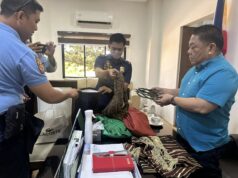(Retired priest Fr. Apollo de Guzman never tires in going up the mountain fastness of the Sierra Madre to be with the Dumagats.)
CABANATUAN CITY – Retired Catholic priest Fr. Apollo de Guzman is batting for the enlistment of tribesmen as greening warriors even as he presses for a no-nonsense reforestation program particularly for the denuded Sierra Madre mountain range.
“It’s a mortal sin for them to harm trees,” de Guzman said. “They can plant, tend, and protect trees and raise crops,” he added.
He particularly referred to the experience of a group of Aeta tribesmen in a resettlement site in Sitio Bacao, inside the military reservation in Fort Magsaysay, Palayan City. He said a 1,000-hectare area has now turned into a model of a greening project.
The project is also turning out as a convergence approach of different sectors in improving further a formerly barren area.
De Guzman, who shuffles from a retirement house of priests here and in a diocese in Belgium where he was assigned for several years, said he is also assisting about 100 families of the Dumagats high up in the mountains in Rio Chico, Gen. Tinio, Nueva Ecija.
They can also be enlisted for the reforestation program of the government as “we have already provided them initial knowledge about the re-greening program of the bald mountains.”
A school, which he helped establish on that mountain community, is helping educate the youth particularly in nurturing the environment, he said.
De Guzman revealed that the Dumagats are close to him as he helped them freed from their alleged “debt slavery”. They were led to believe then, he said, that their forefathers owed some lowland dwellers loan that they had to pay weekly with loads of rattan. With the help of a lawyer, they understood that they were hoodwinked and freed themselves from the “slavery”.
In Sitio Bacao, De Guzman recalled that when the Aetas in Zambales were displaced by the Mt. Pinatubo eruption, he requested authorities in Fort Magsaysay to provide an area for 1,000 hectares as a resettlement site. He was then head of the Diocesan Tribal Apostolate of the Diocese of Cabanatuan.
It led to the signing of a memorandum of agreement between then Army 7th Division commander Brig. Gen. Orlando Soriano and Sofio Balce, then bishop of the diocese.
“The place was a wilderness then,” De Guzman said. “But he continuously inspired them… that assistance would be coming and that they can turn the place into a Garden of Eden with improved vegetation,” he added.
When De Guzman left for Belgium, another priest, Fr. Chito Beltran, was appointed by the diocesan office as the point man in the area.
Then the Bacao Ecological System and Technologies, Inc. (BESTIE) was formed with retired judge Virgilio Caballero as chair. An agreement with the Department of Environment and Natural Resources (DENR) for a reforestation project was forged.
“Look, about 800 hectares are now with growing trees, tended and guarded by the Aeta “Bantay-Gubat.” The remaining areas are for rice and vegetable growing. For the women and some youths, their vegetable gardening, at one time, fetched P200,000 earnings,” De Guzman said..
The Aetas were being paid by the DENR for every hectare tended, which amount is shared by the community members.
De Guzman said given the assistance and appropriate guidance, the tribesmen can help much in the government’s re-greening program and the care of the environment. He said he is asking the DENR to replicate the Bacao experience.
“If the government’s various reforestation programs which were given eloquent-sounding names allotted millions of pesos of World Bank money and apparently failed, why not try the tribesmen. They will deliver… They will not commit shenanigans,” De Guzman said.
The retired priest noted that most of the reforestation project in North Nueva Ecija, for which the money spent by the government though a loan acquired from the World Bank, had been devastated by fire.





